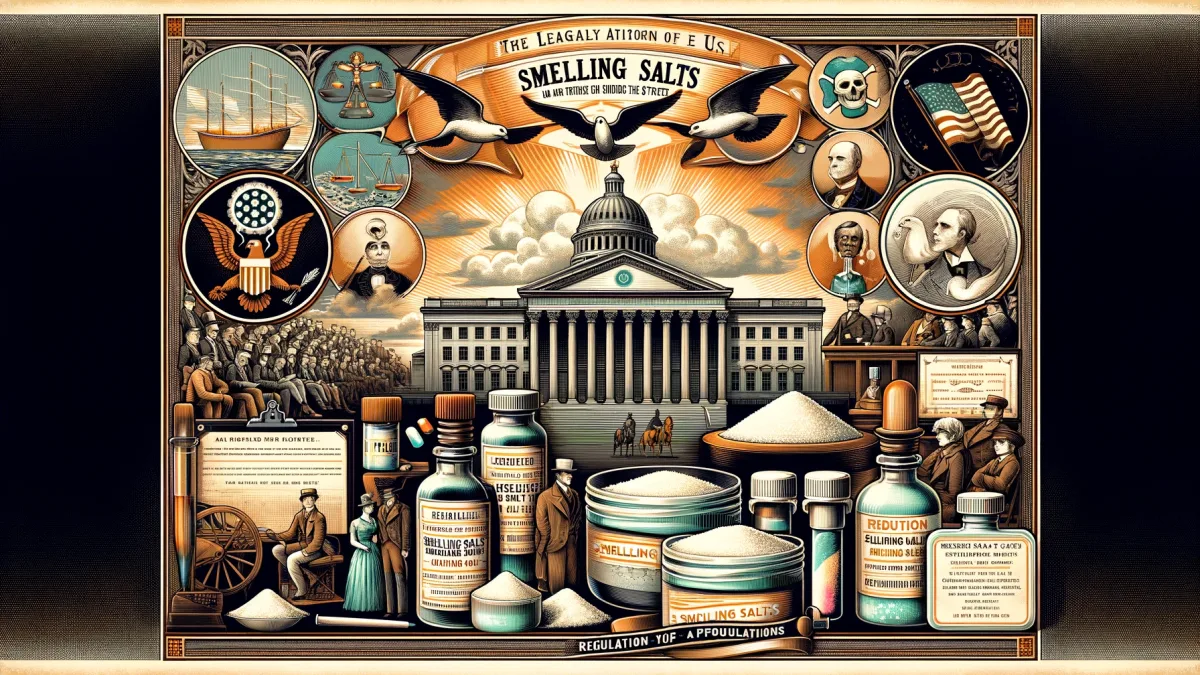Greetings, legal enthusiasts and curious minds! Today, we’re diving nose-first into a topic that’s as pungent as it is perplexing: the legality of smelling salts in the United States. Whether you’re a sports fan who’s seen athletes take a whiff to get revved up, a history buff, or someone just curious about these potent stimulants, you’ve come to the right place. Let’s clear the air on smelling salts and their standing in the law.
What Are Smelling Salts, Anyway?
Before we tackle the legalities, let’s understand what we’re talking about. Smelling salts, historically known as “sal volatile” or ammonium carbonate, are chemical compounds that release ammonia gas. When inhaled, the gas irritates the mucous membranes of the nose and lungs, triggering a reflex causing the muscles that control breathing to work faster, which can result in a temporary boost of alertness and energy.
A Historical Sniff Through Time
Smelling salts have been around since Roman times, used for everything from reviving the faint-hearted to providing a pick-me-up during long sessions of… well, whatever Romans did for entertainment. Fast forward to the Victorian era, and smelling salts were a staple accessory for ladies prone to swooning. In modern times, they’ve found their niche in sports, healthcare, and emergency response for a quick arousal from faintness or lightheadedness.
The Legality Lowdown
Now, onto the meaty question: Are smelling salts illegal? In the United States, smelling salts themselves are not banned or illegal. However, like many substances, the context of their use and sale is subject to regulation.
Regulatory Bodies and Guidelines
The Food and Drug Administration (FDA) and the Consumer Product Safety Commission (CPSC) are two key regulatory bodies that might have a say in the legality and regulation of smelling salts, particularly regarding their composition, labeling, and sale as consumer products.
Keyword Spotlight: “FDA Approval”
While the FDA regulates medications and medical devices to ensure safety and efficacy, smelling salts fall into a bit of a gray area. They’re not classified as a drug per se but as a consumer product, which means they don’t require FDA approval. However, manufacturers and distributors must ensure their products are safe for use and properly labeled.
Athletic Use and Controversies
In the sports world, smelling salts are used for a quick wake-up call on the sidelines. The NFL, NHL, and boxing are notable examples where smelling salts have made appearances. While not illegal, their use is somewhat controversial, with debates around health implications and whether they provide an unfair advantage.
Safety and Health Considerations
The primary concern with smelling salts is their potential health impact. Inhaling ammonia can be irritating and harmful in high concentrations or with prolonged exposure. This has led some sports organizations and health professionals to caution against their use, especially without proper guidance.
State Laws and Local Ordinances
While federal regulations might be broad, state laws and local ordinances could have more specific stipulations regarding the sale and use of substances like smelling salts, especially in settings like schools, sports leagues, and public events.
Navigating Legal and Ethical Use
For those considering the use of smelling salts, whether for personal use, in sports, or in a professional setting, the key is to navigate both legal and ethical considerations. Understanding the potential risks, respecting guidelines and regulations, and considering the welfare of those involved are all crucial steps.
Final Thoughts: A Breath of Legal Air
So, are smelling salts illegal? In short, no—but their use and sale are not without legal and health considerations. As we’ve seen, smelling salts occupy a fascinating niche at the intersection of history, medicine, sports, and law. Whether you’re a coach, athlete, healthcare provider, or just someone intrigued by their storied past and present applications, staying informed about the legal landscape and safety guidelines is essential.









Leave a Reply